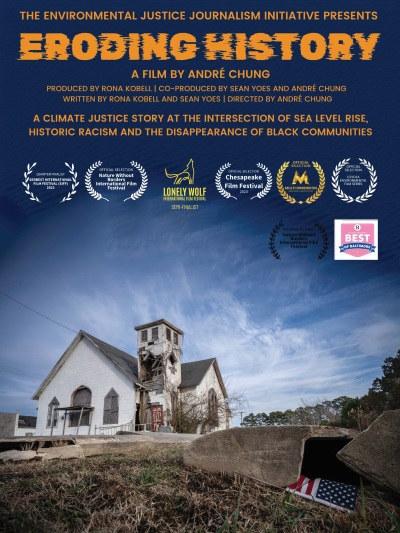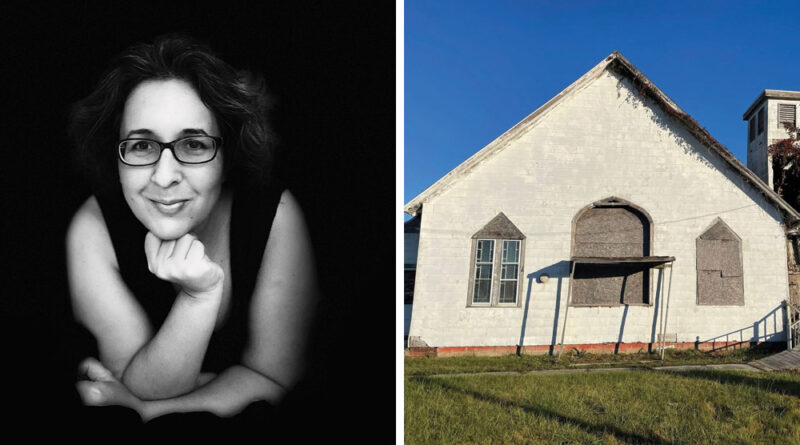Floods, landslides, drought, fires, disease — the effects of climate change are all around. Yet, climate change is not an equal opportunity crisis. It disproportionally impacts poor people of color who often don’t have resources to protect their properties and communities from environmental hazards.
The documentary “Eroding History” explores the impact of racism and climate change on two Black communities on Maryland’s Eastern Shore. The film premiered at the Senator Theatre last April and aired on Maryland Public Television for “Chesapeake Bay Week,” Apr. 21-27. It also will stream on PBS.org.
“The film is about these two communities on Deal Island trying to hold on to their history, culture, heritage and extended families. It’s about how they do that and what their hopes are for the future,” says Rona Kobell, a local environmental journalist and reporter for the Baltimore Banner who served as producer, co-writer and lead fundraiser on the film, which she made with journalist Sean Yoes and filmmaker Andre’ Chung.
Once centers of Black life with thriving seafood and canning industries, the Deal Island towns were mostly abandoned by those in search of jobs and better living conditions. Meanwhile, rising water levels have destroyed homes, churches and cemeteries in the area.

Though “Eroding History” took only nine months to make, the filmmakers’ interests in environmental justice and the Eastern Shore pre-dated the documentary. Kobell first became focused on the Eastern Shore’s Black communities shortly after Hurricane Sandy in 2012.
“I began to realize the inequity in terms of who got aid and who didn’t,” said Kobell, a Towson resident and Bolton Street Synagogue member who worked as a journalist for The Baltimore Sun for nine years. “The Black communities in Crisfield, Maryland, really had to fight to get any help after the storm. And millions of dollars were spent on Smith Island, which had very little damage. Smith Island is all white.”
When the Harriet Tubman Underground Railroad Visitor Center opened in 2017 in Dorchester County, Kobell toured the museum with some of the abolitionist’s descendants.
“Talking to them made me realize just how intertwined the slavery system still was on the Eastern Shore in terms of who owned land and who didn’t, and who got assistance and who didn’t,” said Kobell, co-founder of the nonprofit Environmental Justice Journalism Initiative and an affiliate professor at Loyola College.
For the next several years, Kobell worked for Maryland Sea Grant — which is part of the University System of Maryland — and edited that organization’s magazine, Chesapeake Quarterly. When she decided to pursue a master of arts degree in journalism at the University of Maryland, College Park, she knew she would write her thesis about Deal Island’s Black communities.
But first, she had to immerse herself in the community. So Kobell rented a cottage there and interviewed people with connections to the area. She discovered cemeteries under water, homes in ruins due to mold and water damage, and people who faced resistance from authorities when seeking to prevent further loss of their history.
These losses resonated deeply with Kobell, whose mother lost many family members during the Holocaust and whose grandfather was born in Ukraine.
“I can’t go back to where my family is buried and see their graves,” she said. “There is a sanctity to graves and making sure they are taken care of and tended to. We can do that for the Black families who came to this country, many against their will. … We spend a lot of money to preserve and protect plantations, lighthouses and other vestiges of antebellum life. We also can protect Black cemeteries and Black churches.”
Kobell completed her master’s program in 2022, assuming her work on Deal Island was done. But soon afterward, she texted a photo of a flooded church and cemetery to Yoes and Chung, who were on the Eastern Shore working on a film. Kobell thought they might be interested in seeing the sites.
“They called me and said, ‘We went to the church, we saw the cemetery. We think this would be a great film. Would you be interested in making this film with us?’”
One obstacle was funding. But Kobell identified an Eastern Shore resident willing to donate money for preliminary research. “We did that, and that really got us going,” she said. “From there, the three of us decided that we were going to make a film.”
Since the film’s premiere, Kobell, Yoes and Chung have screened “Eroding History” at film festivals, schools, museums and conferences. They charge a $250 screening fee that is donated to Deal Island’s historic John Wesley Methodist Church. So far, the filmmakers have raised more than $2,000.
Kobell hopes the money will be used to repurpose the church as a museum showcasing “the great skill of Black watermen and great contributions they made to the foundation of this country.”
Though some steps have been taken to mitigate flooding on Deal Island, Kobell says there remains “an overall question with what happens in these coastal communities — Black areas and white areas.
“The people who live there need to be involved in any conversation about that,” she says. “If they want to be bought out so they can move somewhere, that should be explored. If they want fortification so they can stay, that should be explored. What I want is for them to be listened to and for things to be equitable.”
For information about “Eroding History” visit ejji.org/film.





